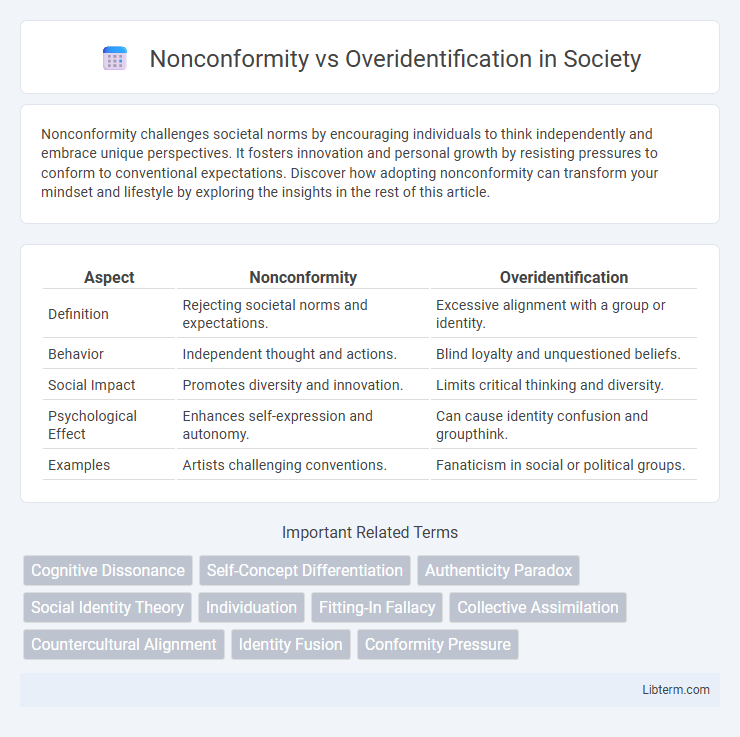Nonconformity challenges societal norms by encouraging individuals to think independently and embrace unique perspectives. It fosters innovation and personal growth by resisting pressures to conform to conventional expectations. Discover how adopting nonconformity can transform your mindset and lifestyle by exploring the insights in the rest of this article.
Table of Comparison
| Aspect | Nonconformity | Overidentification |
|---|---|---|
| Definition | Rejecting societal norms and expectations. | Excessive alignment with a group or identity. |
| Behavior | Independent thought and actions. | Blind loyalty and unquestioned beliefs. |
| Social Impact | Promotes diversity and innovation. | Limits critical thinking and diversity. |
| Psychological Effect | Enhances self-expression and autonomy. | Can cause identity confusion and groupthink. |
| Examples | Artists challenging conventions. | Fanaticism in social or political groups. |
Understanding Nonconformity: Definition and Significance
Nonconformity refers to the deliberate refusal to adhere to established norms, rules, or expectations, often serving as a catalyst for social change and innovation. Understanding nonconformity involves recognizing its role in challenging conventional thinking, fostering diversity of ideas, and promoting individual authenticity. Its significance lies in enabling progress by questioning standardized practices and encouraging alternative perspectives within various social, cultural, and organizational contexts.
Overidentification Explained: Meaning and Impact
Overidentification occurs when an individual excessively aligns with a group, ideology, or belief system, leading to a loss of personal identity and critical thinking. This psychological phenomenon can result in biased decision-making, reduced creativity, and increased susceptibility to groupthink, impacting social and professional dynamics. Understanding overidentification is crucial for fostering individuality and maintaining a balanced self-concept in diverse environments.
Key Differences Between Nonconformity and Overidentification
Nonconformity involves resisting social norms and expressing individuality without attachment to group identity, whereas overidentification entails an excessive alignment with a group or ideology, often leading to loss of personal autonomy. Nonconformity promotes independent thinking and critical evaluation, while overidentification causes rigid adherence and potential blind loyalty. Key differences lie in autonomy versus dependence on group identity, flexibility of beliefs, and motivations driving behavior.
Psychological Roots of Nonconformity
Nonconformity often stems from intrinsic psychological needs for autonomy, identity expression, and resistance to social pressure, highlighting individuals' desire to assert personal values against prevailing norms. Overidentification, in contrast, may arise from a psychological dependence on group identity to bolster self-esteem and reduce anxiety by aligning closely with collective beliefs. These divergent roots illustrate the complex interplay between individual independence and the human need for social belonging in shaping behavior.
The Risks and Consequences of Overidentification
Overidentification with a particular group or ideology can lead to cognitive biases, reducing critical thinking and increasing susceptibility to misinformation. This psychological entrapment risks alienation from diverse perspectives, which may impair decision-making and social cohesion. Overidentification often results in polarizing behaviors that can escalate conflicts and hinder conflict resolution in personal and professional environments.
Nonconformity in Personal Growth and Innovation
Nonconformity plays a crucial role in personal growth and innovation by challenging existing norms and encouraging unique perspectives. Embracing nonconformity fosters creativity, problem-solving, and adaptability, which drive breakthroughs and continuous improvement. This mindset cultivates resilience and self-awareness, enabling individuals to pursue authentic goals and transformative ideas beyond conventional limits.
Social Pressures and the Path to Overidentification
Social pressures often drive nonconformity as individuals resist prevailing norms to assert identity, yet prolonged exposure to these pressures can lead to overidentification, where one rigidly adopts a group's beliefs to gain acceptance. The path to overidentification involves a psychological shift from critical independence toward an uncritical adherence to group ideology, often fueled by fear of social exclusion. This dynamic highlights the complex interplay between social influence and personal identity development in navigating conformity boundaries.
Balancing Authenticity: Navigating Between Nonconformity and Overidentification
Balancing authenticity involves navigating the tension between nonconformity, which emphasizes individual expression and resistance to social norms, and overidentification, where one becomes excessively attached to group identities or ideologies. Maintaining genuine self-expression requires awareness of when nonconformity risks alienation or when overidentification limits personal growth by restricting diverse perspectives. Effective authenticity embraces adaptive self-awareness, enabling individuals to affirm unique values without succumbing to rigid groupthink or isolated rebellion.
Real-Life Examples: Nonconformists vs Overidentified Individuals
Nonconformists challenge societal norms by embracing unique identities and innovative ideas, such as artists who reject traditional styles to create groundbreaking work. Overidentified individuals, like those deeply entangled in a singular ideology or group identity, may resist change and shut down alternative viewpoints, exemplified by rigid political partisans. Real-life examples include entrepreneurs thriving by defying conventional business models, contrasting with employees strictly adhering to corporate cultures despite personal misalignment.
Cultivating Healthy Self-Expression in a Conforming World
Nonconformity challenges societal norms by encouraging authentic self-expression, while overidentification leads to rigid self-definition based on group identity, often limiting personal growth. Cultivating healthy self-expression requires balancing individual uniqueness with social belonging, fostering resilience against external pressures to conform. Embracing diverse perspectives promotes psychological well-being and empowers individuals to navigate conformity without losing their true selves.
Nonconformity Infographic

 libterm.com
libterm.com